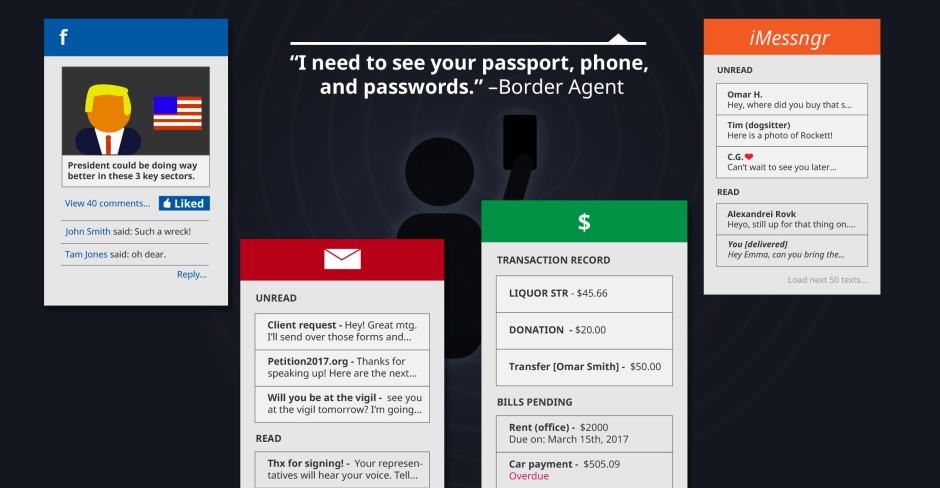Your shoes, your liquids… and your Facebook password?
Disturbing new proposals in the U.S. could force every traveler to hand over their digital devices and social media passwords. We’re taking action.
Your shoes, your liquids… and your Facebook password?
Can you imagine doing this at the airport? You take off your shoes, put your liquids in the x-ray tray... and then hand over your unlocked phone to a border agent for them to look through?
In the U.S., a disturbing proposal is on the table: Key U.S. politicians want to force every single traveller crossing the border to hand over their digital devices, unlock them, and provide their social media passwords.
Border agents would then look through your private messages to loved ones, sensitive financial information, photos, browsing history, and contacts - and even download the information to store it in their giant databases.
This is already happening right now
Many people are shocked to hear that it’s already perfectly legal for border agents to compel travelers to unlock their digital devices.
Normally, the U.S. Fourth Amendment protects against warrantless and suspicionless searches. But many decades ago, borders were exempted from this requirement. That means it’s completely legal for a border agent to demand you hand over and unlock your digital devices, without needing to prove any kind of suspicion - and they can even detain you if you refuse.
Not only is this legal in the U.S., it’s also legal in other countries like Canada, where border officials exploit legal loopholes to conduct invasive searches of phones and laptops.
Searching a device has become a huge violation of basic privacy
In the many years since this exception has been put in place, technology has advanced considerably. While looking through someone’s phone might once have been on par with looking through a wallet or suitcase, nowadays our devices are more akin to digital extensions of our whole lives. Apps store our most intimate messages with loved ones, our photos, our finances, our political views - even drafts and deleted messages we never intended to share with anyone. And with our information increasingly being stored in the cloud, rather than locally, someone can easily access information that was never on the device in the first place.
Just the sheer amount of information and connections we share online can put us at risk of all sorts of troubling conclusions. Common scenarios, like being added to a group chat where someone posts an objectionable message or image, or even the most casual connection via a site like LinkedIn or Twitter with a ‘person of interest’ to the police can put someone at risk.
If this is already legal, why act now?'
Homeland Security Secretary John Kelly has just testified in front of the House Homeland Security Committee that he wants this process extended as a matter of routine - and that he wants to include the handover of social media passwords. If Secretary Kelly gets his way, they're not going to stop until every single traveller across a U.S. border is subjected to this gross civil rights violation.
Simply put, this takes an already dangerous and highly invasive practice and makes it a requirement for every single traveler to the U.S. And what happens in the U.S. affects the rest of the world. If we don't speak up now these mandatory phone download powers will become the norm not just in the U.S., but all over the globe.
The good news is that this proposal has put the issue of invasive device searches at borders under the spotlight. In fact, U.S. Senator Ron Wyden has just released a letter to Secretary Kelly decrying the new proposals and vowing to introduce legislation that will require a warrant for any searches of devices and which would prohibit forcing travelers to reveal their social media passwords.
Right now, it’s a crucial time for us to act on this issue. Not only do we stand the greatest chance of success if we can stop this proposal long before it becomes law, but we also have a real chance to address this longstanding violation of our most basic privacy rights.


 Take action now!
Take action now!
 Sign up to be in the loop
Sign up to be in the loop
 Donate to support our work
Donate to support our work